人教版(2019)选择性必修 第三册Unit 3 Environmental Protection Discovering Useful Structures 课件(共23张PPT)
文档属性
| 名称 | 人教版(2019)选择性必修 第三册Unit 3 Environmental Protection Discovering Useful Structures 课件(共23张PPT) |

|
|
| 格式 | pptx | ||
| 文件大小 | 1.0MB | ||
| 资源类型 | 教案 | ||
| 版本资源 | 人教版(2019) | ||
| 科目 | 英语 | ||
| 更新时间 | 2024-04-08 00:00:00 | ||
图片预览


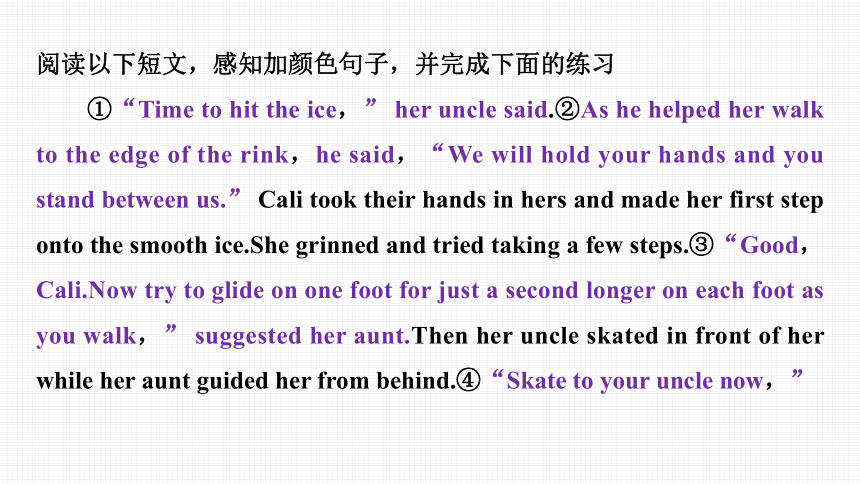
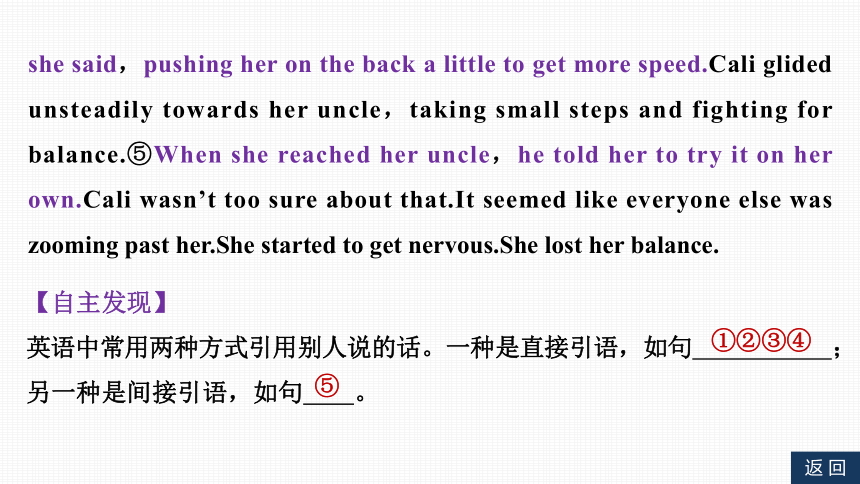

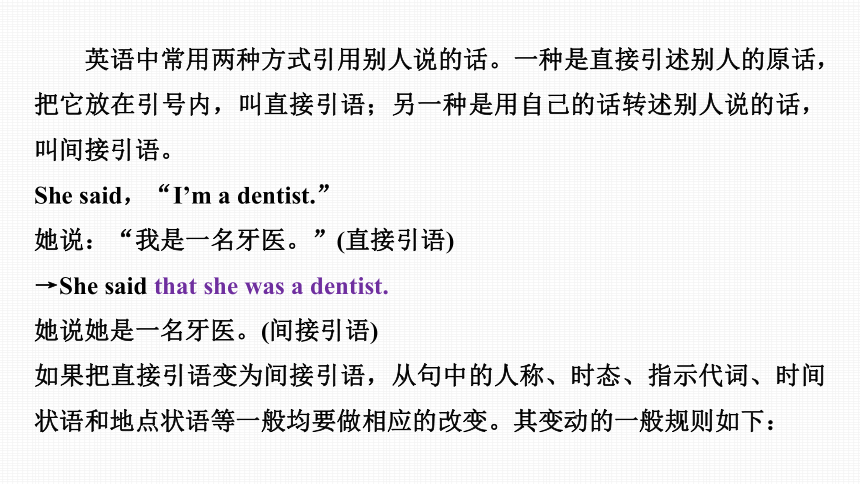
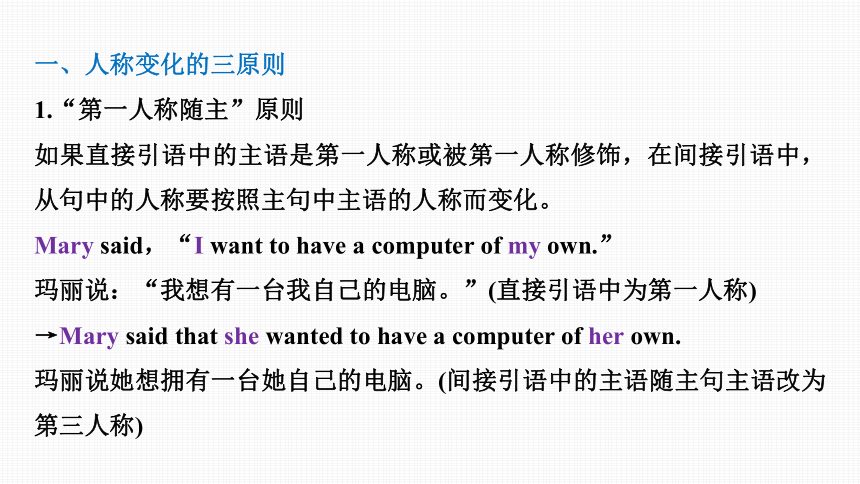
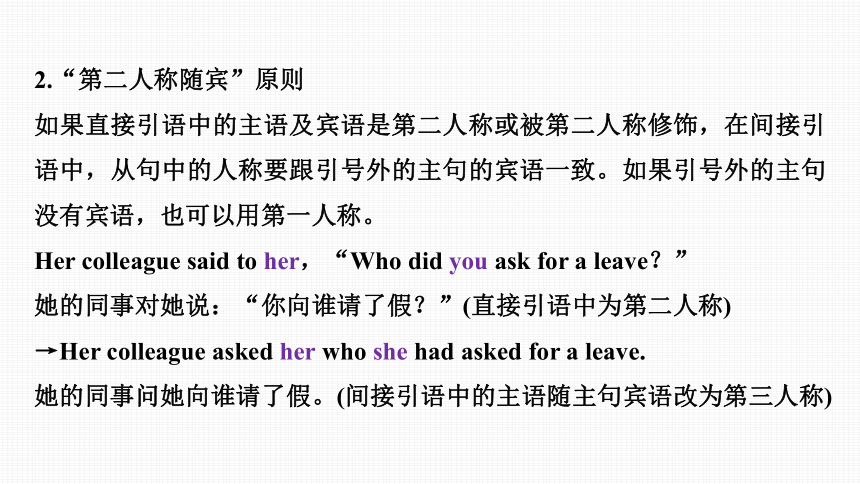
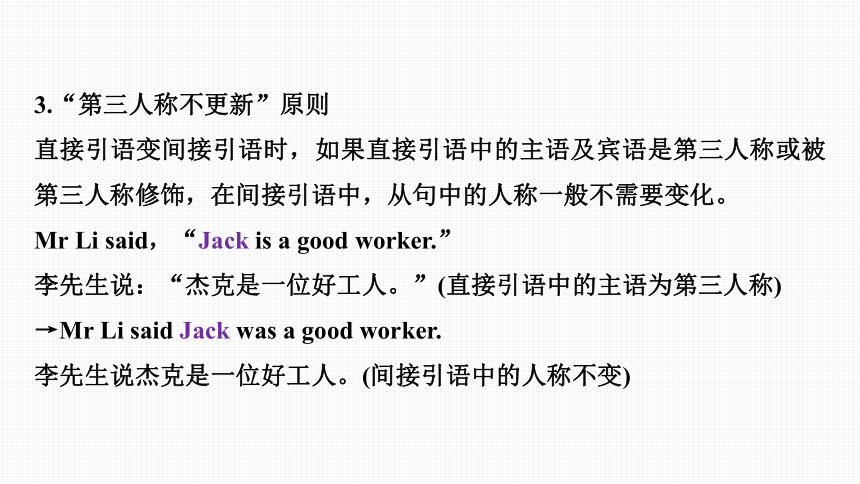
文档简介
(共23张PPT)
Discovering Useful Structures—Direct speech & indirect speech
Unit 3
Environmental protection
语境 感悟
阅读以下短文,感知加颜色句子,并完成下面的练习
①“Time to hit the ice,” her uncle said.②As he helped her walk to the edge of the rink,he said,“We will hold your hands and you stand between us.” Cali took their hands in hers and made her first step onto the smooth ice.She grinned and tried taking a few steps.③“Good,Cali.Now try to glide on one foot for just a second longer on each foot as you walk,” suggested her aunt.Then her uncle skated in front of her while her aunt guided her from behind.④“Skate to your uncle now,”
she said,pushing her on the back a little to get more speed.Cali glided unsteadily towards her uncle,taking small steps and fighting for balance.⑤When she reached her uncle,he told her to try it on her own.Cali wasn’t too sure about that.It seemed like everyone else was zooming past her.She started to get nervous.She lost her balance.
【自主发现】
英语中常用两种方式引用别人说的话。一种是直接引语,如句 ;
另一种是间接引语,如句 。
返 回
①②③④
⑤
语法 精讲
英语中常用两种方式引用别人说的话。一种是直接引述别人的原话,把它放在引号内,叫直接引语;另一种是用自己的话转述别人说的话,叫间接引语。
She said,“I’m a dentist.”
她说:“我是一名牙医。”(直接引语)
→She said that she was a dentist.
她说她是一名牙医。(间接引语)
如果把直接引语变为间接引语,从句中的人称、时态、指示代词、时间状语和地点状语等一般均要做相应的改变。其变动的一般规则如下:
一、人称变化的三原则
1.“第一人称随主”原则
如果直接引语中的主语是第一人称或被第一人称修饰,在间接引语中,从句中的人称要按照主句中主语的人称而变化。
Mary said,“I want to have a computer of my own.”
玛丽说:“我想有一台我自己的电脑。”(直接引语中为第一人称)
→Mary said that she wanted to have a computer of her own.
玛丽说她想拥有一台她自己的电脑。(间接引语中的主语随主句主语改为第三人称)
2.“第二人称随宾”原则
如果直接引语中的主语及宾语是第二人称或被第二人称修饰,在间接引语中,从句中的人称要跟引号外的主句的宾语一致。如果引号外的主句没有宾语,也可以用第一人称。
Her colleague said to her,“Who did you ask for a leave?”
她的同事对她说:“你向谁请了假?”(直接引语中为第二人称)
→Her colleague asked her who she had asked for a leave.
她的同事问她向谁请了假。(间接引语中的主语随主句宾语改为第三人称)
3.“第三人称不更新”原则
直接引语变间接引语时,如果直接引语中的主语及宾语是第三人称或被第三人称修饰,在间接引语中,从句中的人称一般不需要变化。
Mr Li said,“Jack is a good worker.”
李先生说:“杰克是一位好工人。”(直接引语中的主语为第三人称)
→Mr Li said Jack was a good worker.
李先生说杰克是一位好工人。(间接引语中的人称不变)
直接引语 间接引语
句子时态 一般现在时 一般过去时
现在进行时 过去进行时
现在完成时 过去完成时
一般过去时 过去完成时
过去完成时 不变
一般将来时 过去将来时
二、时态的变化
直接引语变间接引语时,如果主句为过去时态,间接引语的时态则相应向前推一个时态。如下表所示:
His friend said to him,“We are planning to have a picnic.”
他的朋友对他说:“我们正计划去野餐。”(直接引语为现在进行时)
→His friend told him that they were planning to have a picnic.
他的朋友告诉他他们正计划去野餐。(间接引语为过去进行时)
The organizer said,“We have begun our plan.”
组织者说:“我们已开始了我们的计划。”(直接引语为现在完成时)
→The organizer said that they had begun their plan.
组织者说他们已开始了他们的计划。(间接引语为过去完成时)
注意:直接引语变间接引语,时态无变化的情况:
1.直接引语是客观真理、谚语或格言;
2.直接引语中有具体的过去的某年、某月、某日作状语。
Our teacher said to us yesterday,“Early birds catch worms.”
昨天老师对我们说:“早起的鸟儿有虫吃。”(直接引语是谚语)
→Our teacher told us yesterday that early birds catch worms.
昨天老师告诉我们早起的鸟儿有虫吃。(间接引语时态不变)
引语 用词 直接引语 间接引语
指示代词 this这个 that那个
these这些 those那些
时间状语 now现在 then那时
today今天 that day那天
this morning今天上午 that morning那天上午
tonight今天晚上 that night那天晚上
tomorrow明天 the next/following day第二天
三、指示代词、时间状语、地点状语及方向性动词的变化
时间状语 yesterday昨天 the day before前一天
last night昨天晚上 the night before前一天晚上
the day before yesterday前天 two days before两天前
three days ago三天前 three days before三天前
next week下一周 the next/following week第二周
ago(至今)以前 before(那时)以前
地点状语 here这儿 there那儿
方向性 动词 bring带来 take带走
come来 go去
She asked,“Is this book his?”
她问:“这本书是他的吗?”(直接引语中用this)
→She asked whether that book was his.
她问那本书是不是他的。(间接引语中改为that)
“I’ll be very busy today,” said the man.
那个人说:“我今天会很忙。”(直接引语中用today)
→The man said he would be very busy that day.
那个人说那天他会很忙。(间接引语中改为that day)
四、连接词的选择
1.直接引语是陈述句,变为间接引语时,常变成由that引导的宾语从句。在口语中,that可以省略。
He said,“I was cooking when the earthquake happened.”
他说:“地震发生时,我正在做饭。”
→He said (that) he was cooking when the earthquake happened.
他说地震发生时,他正在做饭。
2.直接引语是一般疑问句、选择疑问句或反意疑问句时,间接引语中用whether(...or ...或...or not)或if引导。
He said,“Are you interested in English?”
他说:“你对英语感兴趣吗?”
→He asked (me) if/whether I was interested in English.
他问我是否对英语感兴趣。
注意:如果主句中谓语动词是said,则将其改为asked。
3.直接引语为特殊疑问句时,间接引语仍用原句中的特殊疑问词来引导,其余的变化遵照直接引语和间接引语之间的转换规则来进行。
“What’s your name?” he asked me.
“你叫什么名字?”他问我。
→He asked me what my name was.
他问我我的名字是什么。
注意:疑问句的直接引语变间接引语时,要把疑问语序变成陈述语序。
五、直接引语为祈使句时的变化
当直接引语为祈使句,变间接引语时主句的谓语动词应根据直接引语的口气换用ask,invite,advise,warn,tell,order等词,而原直接引语中的谓语动词则变为不定式。
He said to me,“Don’t be late tomorrow.”
他对我说:“明天不要迟到。”
→He told me not to be late the next day.
他告诉我第二天不要迟到。
The official said,“Get ready before lunch.”
这位官员说:“午餐之前要准备好。”
→The official ordered us to get ready before lunch.
这位官员要求我们在午餐之前准备好。
返 回
达标检测
A few minutes later,the other two cyclists arrived.They were shocked to find Mac’s bicycle lying on the road,his tent bag torn and Mac just like a drowned mouse.They asked anxiously 1. (到底发生了什么).Mac responded breathlessly that 2._____________________
(他差点被一匹狼吃掉).When told about 3.________________________
(Mac经历了什么),they couldn’t help screaming out,“What a narrow escape!” “Yes,without their timely help,4.________________________
(我早已经是狼的盘中餐了).”
根据括号内的汉语提示完成下列短文
what on earth had happened
he was almost eaten by
a wolf
what Mac had experienced
I would have been the food
of the wolf
Mac’s friends were also thankful to Paul and Becky.Afraid that there might be more potential dangers ahead,Paul and Becky asked kindly
5. (他们是否需要搭便车).Mac and his friends answered with one voice,“6. (我们乐意).Thank you from the bottom of our hearts!”
返 回
whether/if they were in need of a lift
We’d love to
Discovering Useful Structures—Direct speech & indirect speech
Unit 3
Environmental protection
语境 感悟
阅读以下短文,感知加颜色句子,并完成下面的练习
①“Time to hit the ice,” her uncle said.②As he helped her walk to the edge of the rink,he said,“We will hold your hands and you stand between us.” Cali took their hands in hers and made her first step onto the smooth ice.She grinned and tried taking a few steps.③“Good,Cali.Now try to glide on one foot for just a second longer on each foot as you walk,” suggested her aunt.Then her uncle skated in front of her while her aunt guided her from behind.④“Skate to your uncle now,”
she said,pushing her on the back a little to get more speed.Cali glided unsteadily towards her uncle,taking small steps and fighting for balance.⑤When she reached her uncle,he told her to try it on her own.Cali wasn’t too sure about that.It seemed like everyone else was zooming past her.She started to get nervous.She lost her balance.
【自主发现】
英语中常用两种方式引用别人说的话。一种是直接引语,如句 ;
另一种是间接引语,如句 。
返 回
①②③④
⑤
语法 精讲
英语中常用两种方式引用别人说的话。一种是直接引述别人的原话,把它放在引号内,叫直接引语;另一种是用自己的话转述别人说的话,叫间接引语。
She said,“I’m a dentist.”
她说:“我是一名牙医。”(直接引语)
→She said that she was a dentist.
她说她是一名牙医。(间接引语)
如果把直接引语变为间接引语,从句中的人称、时态、指示代词、时间状语和地点状语等一般均要做相应的改变。其变动的一般规则如下:
一、人称变化的三原则
1.“第一人称随主”原则
如果直接引语中的主语是第一人称或被第一人称修饰,在间接引语中,从句中的人称要按照主句中主语的人称而变化。
Mary said,“I want to have a computer of my own.”
玛丽说:“我想有一台我自己的电脑。”(直接引语中为第一人称)
→Mary said that she wanted to have a computer of her own.
玛丽说她想拥有一台她自己的电脑。(间接引语中的主语随主句主语改为第三人称)
2.“第二人称随宾”原则
如果直接引语中的主语及宾语是第二人称或被第二人称修饰,在间接引语中,从句中的人称要跟引号外的主句的宾语一致。如果引号外的主句没有宾语,也可以用第一人称。
Her colleague said to her,“Who did you ask for a leave?”
她的同事对她说:“你向谁请了假?”(直接引语中为第二人称)
→Her colleague asked her who she had asked for a leave.
她的同事问她向谁请了假。(间接引语中的主语随主句宾语改为第三人称)
3.“第三人称不更新”原则
直接引语变间接引语时,如果直接引语中的主语及宾语是第三人称或被第三人称修饰,在间接引语中,从句中的人称一般不需要变化。
Mr Li said,“Jack is a good worker.”
李先生说:“杰克是一位好工人。”(直接引语中的主语为第三人称)
→Mr Li said Jack was a good worker.
李先生说杰克是一位好工人。(间接引语中的人称不变)
直接引语 间接引语
句子时态 一般现在时 一般过去时
现在进行时 过去进行时
现在完成时 过去完成时
一般过去时 过去完成时
过去完成时 不变
一般将来时 过去将来时
二、时态的变化
直接引语变间接引语时,如果主句为过去时态,间接引语的时态则相应向前推一个时态。如下表所示:
His friend said to him,“We are planning to have a picnic.”
他的朋友对他说:“我们正计划去野餐。”(直接引语为现在进行时)
→His friend told him that they were planning to have a picnic.
他的朋友告诉他他们正计划去野餐。(间接引语为过去进行时)
The organizer said,“We have begun our plan.”
组织者说:“我们已开始了我们的计划。”(直接引语为现在完成时)
→The organizer said that they had begun their plan.
组织者说他们已开始了他们的计划。(间接引语为过去完成时)
注意:直接引语变间接引语,时态无变化的情况:
1.直接引语是客观真理、谚语或格言;
2.直接引语中有具体的过去的某年、某月、某日作状语。
Our teacher said to us yesterday,“Early birds catch worms.”
昨天老师对我们说:“早起的鸟儿有虫吃。”(直接引语是谚语)
→Our teacher told us yesterday that early birds catch worms.
昨天老师告诉我们早起的鸟儿有虫吃。(间接引语时态不变)
引语 用词 直接引语 间接引语
指示代词 this这个 that那个
these这些 those那些
时间状语 now现在 then那时
today今天 that day那天
this morning今天上午 that morning那天上午
tonight今天晚上 that night那天晚上
tomorrow明天 the next/following day第二天
三、指示代词、时间状语、地点状语及方向性动词的变化
时间状语 yesterday昨天 the day before前一天
last night昨天晚上 the night before前一天晚上
the day before yesterday前天 two days before两天前
three days ago三天前 three days before三天前
next week下一周 the next/following week第二周
ago(至今)以前 before(那时)以前
地点状语 here这儿 there那儿
方向性 动词 bring带来 take带走
come来 go去
She asked,“Is this book his?”
她问:“这本书是他的吗?”(直接引语中用this)
→She asked whether that book was his.
她问那本书是不是他的。(间接引语中改为that)
“I’ll be very busy today,” said the man.
那个人说:“我今天会很忙。”(直接引语中用today)
→The man said he would be very busy that day.
那个人说那天他会很忙。(间接引语中改为that day)
四、连接词的选择
1.直接引语是陈述句,变为间接引语时,常变成由that引导的宾语从句。在口语中,that可以省略。
He said,“I was cooking when the earthquake happened.”
他说:“地震发生时,我正在做饭。”
→He said (that) he was cooking when the earthquake happened.
他说地震发生时,他正在做饭。
2.直接引语是一般疑问句、选择疑问句或反意疑问句时,间接引语中用whether(...or ...或...or not)或if引导。
He said,“Are you interested in English?”
他说:“你对英语感兴趣吗?”
→He asked (me) if/whether I was interested in English.
他问我是否对英语感兴趣。
注意:如果主句中谓语动词是said,则将其改为asked。
3.直接引语为特殊疑问句时,间接引语仍用原句中的特殊疑问词来引导,其余的变化遵照直接引语和间接引语之间的转换规则来进行。
“What’s your name?” he asked me.
“你叫什么名字?”他问我。
→He asked me what my name was.
他问我我的名字是什么。
注意:疑问句的直接引语变间接引语时,要把疑问语序变成陈述语序。
五、直接引语为祈使句时的变化
当直接引语为祈使句,变间接引语时主句的谓语动词应根据直接引语的口气换用ask,invite,advise,warn,tell,order等词,而原直接引语中的谓语动词则变为不定式。
He said to me,“Don’t be late tomorrow.”
他对我说:“明天不要迟到。”
→He told me not to be late the next day.
他告诉我第二天不要迟到。
The official said,“Get ready before lunch.”
这位官员说:“午餐之前要准备好。”
→The official ordered us to get ready before lunch.
这位官员要求我们在午餐之前准备好。
返 回
达标检测
A few minutes later,the other two cyclists arrived.They were shocked to find Mac’s bicycle lying on the road,his tent bag torn and Mac just like a drowned mouse.They asked anxiously 1. (到底发生了什么).Mac responded breathlessly that 2._____________________
(他差点被一匹狼吃掉).When told about 3.________________________
(Mac经历了什么),they couldn’t help screaming out,“What a narrow escape!” “Yes,without their timely help,4.________________________
(我早已经是狼的盘中餐了).”
根据括号内的汉语提示完成下列短文
what on earth had happened
he was almost eaten by
a wolf
what Mac had experienced
I would have been the food
of the wolf
Mac’s friends were also thankful to Paul and Becky.Afraid that there might be more potential dangers ahead,Paul and Becky asked kindly
5. (他们是否需要搭便车).Mac and his friends answered with one voice,“6. (我们乐意).Thank you from the bottom of our hearts!”
返 回
whether/if they were in need of a lift
We’d love to
